
“A Free Spirit” Considering Consecrated Life
The Acts of the Apostles contains several versions of some stories. This repetition emphasizes the importance of the event. So, for example, Peter’s vision of the clean and unclean animals receives repeated telling and interpretation (10:9-16; 10:27-29; 11:4-10) as does Cornelius’ vision (10:1-8; 10:22-23; 10:30-33; 11:13-14). The story most clearly told and retold at length is that of the conversion of Paul (9:1-31; 22:1-21; 26:1-23). In this reflection, however, I will consider the way in which the Pentecost event echoes in several contexts. One rendition deserves particular attention.
The most well-known story of the coming of the Comforter stands at the beginning of Acts and speaks about the Holy Spirit’s descent as being like “tongues of fire” (2:1-4), after which the disciples proclaim the message of Jesus boldly. We can, however, look to other situations in which the Paraclete comes upon the community: 4:31, 8:14-17, 10:44-47 and
19:5-6. In three of the reports, with the outpouring of the Spirit, the people speak in tongues (2:4; 10:46; 19:6). What captures my attention is the telling involved in the story of Cornelius:
While Peter was still speaking these things [in the house of Cornelius], the holy Spirit fell upon all who were listening to the word. The circumcised believers who had accompanied Peter were astounded that the gift of the holy Spirit should have been poured out on the Gentiles also, for they could hear them speaking in tongues and glorifying God. Then Peter responded, “Can anyone withhold the water for baptizing these people, who have received the holy Spirit even as we have?” He ordered them to be baptized in the name of Jesus Christ. (Acts 10:44-48)
Careful readers will note: Peter is still speaking when the pouring of the Holy Spirit takes place. In other narratives, the text suggests that the community “summons” the Spirit by prayer or the laying on of hands. In the tale of Cornelius, however, the Advocate arrives unbidden! Does the suggestion that the Spirit interrupts Peter’s proclamation give this detail too much emphasis?
We can understand this particular way of presenting the account as emphasizing the freedom of the Holy Spirit and the coming of the Counselor as a gift. The Intercessor neither responds as the result of an invocation, nor arrives as the reward for celebrating a ritual properly. The Spirit appears without compulsion and gives her gifts with unearned generosity. She abides under no one’s control and follows no predetermined pattern of thinking or acting. The “wildness” of the Paraclete opens up the doors of creativity and welcomes new possibilities, new ways of thinking and acting.
Too often, we use words like “conservative” or “liberal” to categorize a person or group as if one expressed the truth and the other a corruption. In reality, the Spirit brings both attitudes—again not bound by our prejudices or efforts at manipulation. As the “strong driving wind” at Pentecost, she moves where she wills and “fills the entire house”—that is, everyone.
The Spirit brings liberty to thinking, deciding, and acting. We pray to the Holy Spirit as we pick up the Word of God because we want to hear it in ways which deal with our current situation and needs. We invoke the presence of the Counselor as we begin meetings so that we can be wise in our decisions and see possibilities which have eluded us. We want to think “outside the box.” We beg the strength and courage of the Holy Spirit as we undertake new tasks, or carry out the same task on a new day, so that we can see and do what is necessary to further God’s reign. As Jesus reminds us:
“I have much more to tell you, but you cannot bear it now. But when he comes, the Spirit of truth, he will guide you to all truth. He will not speak on his own, but he will speak what he hears, and will declare to you the things that are coming. He will glorify me, because he will take from what is mine and declare it to you.” (Jn 16:12-14)
We are never ready to hear all the instructions of Jesus at one sitting. The Teacher comes in divine freedom to instruct us in the new and wondrous applications of the words of the Lord.
The Spirit also conserves and preserves the truth and direction of the instruction of Jesus and the Church. We pray to the Holy Spirit as we pick up the Word of God because we want to hear it in keeping with and enlightened by the whole instruction which the Lord offers for our current situation and needs. We invoke the presence of the Counselor as we begin meetings so that we can continue to see the ways in which our decisions and possibilities strengthen and remain faithful to the paths which we follow in continuity with those who have gone before us. We beg the strength and courage of the Sanctifier as we undertake new tasks, or carry out the same task on a new day, so that we can see and do what is necessary to further God’s reign. As Jesus reminds us:
“I have much more to tell you, but you cannot bear it now. But when he comes, the Spirit of truth, he will guide you to all truth. He will not speak on his own, but he will speak what he hears, and will declare to you the things that are coming. He will glorify me, because he will take from what is mine and declare it to you.” (Jn 16:12-14)
And so, the Spirit is free. From the view of that Spirit, “liberal” and “conservative” must and do tend in the same direction. As persons consecrated by that divine presence, we pray for her outpouring in our lives and ministries as Pentecost comes upon us.





0 Comments